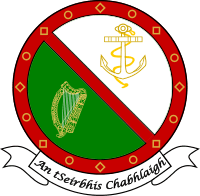Naval College (Ireland)
The Naval College is the principal naval military college in Ireland providing training to cadets, non-commissioned officers and recruits of the Irish Naval Service. The Naval College trains and educates personnel for service, providing a mixture of different courses ranging from officer training right through to naval engineering. The Naval College is based out of the Naval Service's headquarters at Naval Base Haulbowline but also provides classes and lessons in non-military naval training at the nearby National Maritime College of Ireland in Ringaskiddy.[1]
| Naval College | |
|---|---|
| Country | |
| Branch | |
| Part of | |
| Garrison/HQ | Naval Base Haulbowline |
| Website | www |
| Commanders | |
| Current commander | Officer Commanding Naval College |
National Maritime College of Ireland
The Naval Service has forged a very close working relation with the National Maritime College of Ireland, with numerous courses and training programmes provided for recruits and officers of the Naval Service at the National Maritime College. The National Maritime College of Ireland provides the Naval Service with non-military training of personnel utilising state of the art training facilities. Military related training is conducted by the Naval College at Haulbowline.
The Naval College is composed of a number of schools, each providing training and instruction for specialised roles within the Irish Naval Service.[2]
Officer Training School
The Officer Training School is the main school for training of new officer cadets to the Irish Naval Service. The school provides cadet training spread over two years and six terms. The first year of cadet training is conducted at the Naval College in Haulbowline where they are taught basic military training such as weapons handling, marching, physical exercise, orienteering and leadership, among other things. Towards the end of the first year cadets are put to sea on Naval Service vessels to gain practical experience.
The second year of a cadet's training takes place at the National Maritime College of Ireland in Ringaskiddy where they begin a degree course in nautical studies. Upon successful completion of the two-year training cadets become commissioned officers whereupon they continue their training as officers under training at National Maritime College as part of an honours degree in nautical science.[3]
Military and Naval Operational Training School
The Military and Naval Operational Training School provides training to naval personnel in a multitude of different disciplines such as arms drills, tactical training, physical exercises as well as fire fighting and personal survival.[4] Recruits begin with an 18-week training programme before being assigned to one of four job roles: seaman, mechanics, communications or logistics.[5]
School of Naval Engineering
The School of Naval Engineering provides technical training courses in areas such as mechanical, electrical and radar engineering. Other areas of naval learning include how to deal with fire and damage aboard vessels, conforming to standards established by the International Maritime Organization. The National Maritime College of Ireland provides a dedicated fire fighting and damage control training centre as part of this specialised training regimen. Basic and Advanced Fire Fighting courses are certified by the Department of Transport, Tourism and Sport, conforming to standards established by the International Maritime Organization.[6]
Engine Room Artificer
The engine room artificer is responsible for the operation and maintenance of all plant and machinery onboard Naval Service vessels. Such machinery includes propulsion and electrical systems, reverse osmosis plants, hydraulics and pneumatic systems as well as Heating, Ventilation and Air Conditioning equipment.
Hull Artificer
A hull artificer is responsible for maintaining the ship's structural integrity as well as associated systems including plumbing, damage control and fire prevention systems.
Radio Radar Technician
The radio radar technician provides for the maintenance of all ship communication and radar systems. Such systems include satellites, internal communications, broadband, television, radio and radar equipment. Personnel selected for the role of Radio Radar Technicians attend Cork Institute of Technology and study for a Level 7 Degree in Electronic Engineering. Further training in this role is conducted under the Communications & Information Services Corps of the Irish Army at the Defence Forces Training Centre in the Curragh.
Electrical Artificer
Electrical artificers are responsible for the maintenance of all naval electrical equipment such as power systems and electrical wiring. Electrical Artificers receive the same training as Radio Radar Technicians at CIT undertaking the Level 7 Degree in electronic engineering.
References
- "Irish Naval Service Course Details". National Maritime College of Ireland. Retrieved 2017-01-02.
- "Naval College". Defence Forces. Retrieved 2017-01-02.
- "Officer Training and Education". Defence Forces. Retrieved 2017-01-02.
- "Marine Fire Fighting, Fire & Damage control courses, Fire fighting courses". National Maritime College of Ireland. Retrieved 2017-01-02.
- "Military and Naval Operational Training School". Defence Forces. Retrieved 2017-01-02.
- "School of Naval Engineering". Defence Forces. Retrieved 2017-01-02.
